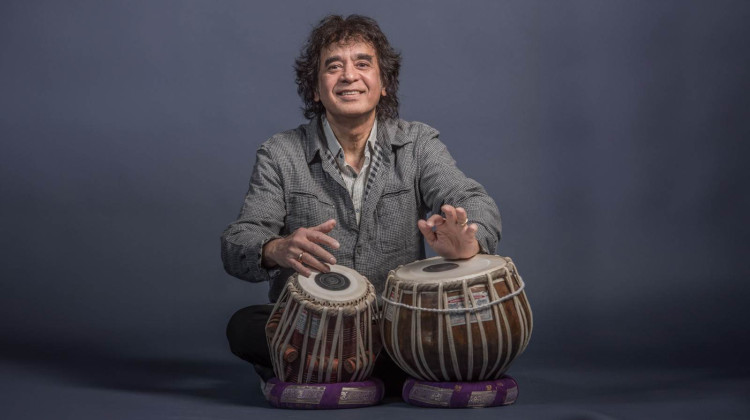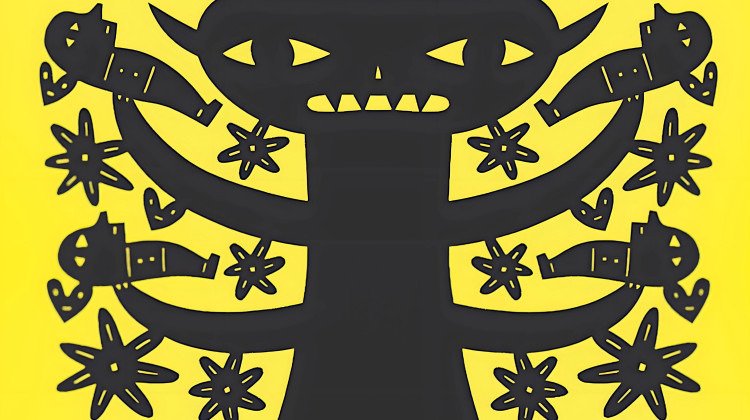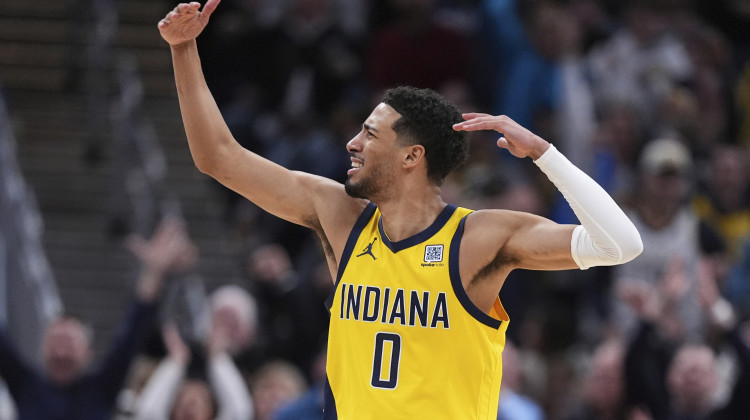
Zakir Hussain is one of the most celebrated performers in the history of Indian classical music. He died on December 15, 2024 at the age of 73.
Courtesy of Zakir HussainMusic fans around the world are mourning the loss of Zakir Hussain, a master of the Indian tabla drum.
Hussain is one of the most celebrated performers in the history of Indian classical music. He also found success in Western music, collaborating with iconic artists including George Harrison, Earth Wind & Fire, Van Morrison, Tina Turner, and members of the Grateful Dead.
WFYI’s Kyle Long brings us this remembrance.
This transcript has been edited for length and clarity.
Kyle Long: The news of Zakir Hussain’s death on December 15, at the age of 73, came as a great shock to his fans. 2024 had been one of Hussain’s most productive years, including record-breaking wins at the Grammys and performance dates around the world.
But signs of trouble appeared last month, when Hussain abruptly canceled his November appearance in Central Indiana. I spoke with Hussain just days before the event’s cancellation. Our conversation was one of the last interviews he recorded.
We discussed his long history of performing in Indiana, dating back to the early 1970s when Hussain was a member of Shanti, a psychedelic rock band that explored North Indian classical music.
Zakir Hussain: So Indiana, for me, coming from Mumbai or Bombay, I was looking for this big metropolis. You know, it's not as big as Mumbai, and it doesn't have as many people on the streets. I would look out the window and say, 'Where are the people?' And it felt like, 'Oh, is anybody going to come to the show?' But again, we had a great time, I remember. It was amazing to see so many people who are not Indians sit in the audience and groove to the music.
Long: I asked Hussain about his historic achievement at this year’s Grammys, when he became the first Indian musician to pick up three awards in one night. In his characteristic fashion Hussain replied with humility, chalking it all up to luck.
Hussain: You know, I have to say, I've been very lucky. I have had opportunities that came my way because of my associations with various musicians. You know, when I arrived here, I arrived in America to play with Ravi Shankar, that led to me teaching at the University of Washington in Seattle, which led to me coming to the Bay Area to teach, and that led to me meeting Mickey Hart from the Grateful Dead, and that led to so many different associations.
So I have to thank my lucky stars that I was brought to some of the most incredible creative artists in the world who saw something in me that they could use, and then brought me along, and which finally led to this incredible moment at the Grammys. I could not have done it without them.
Long: My conversation with Hussain ended on the subject of mortality, as we discussed the death of his friend and mentor Shivkumar Sharma, an influential figure in Indian classical music. Sharma passed away in 2022, and Hussain’s Indiana concert was scheduled as a tribute to Sharma.
Hussain: I have three or four mentors in my life who have helped shape the way I turned out. I would say Ali Akbar Khan, Ravi Shankar, John McLaughlin, Mickey Hart, and I have to say that in the prime place amongst them is Pandit Shivkumar Sharma. I started playing with him when I was about what 16 years old. He was someone I used to sound off with, you know, 'Can I do this? Can I do that?'
He was very generous on stage with me, allowing me to make a fool of myself sometimes, and allowing me to grab the spotlight, and that was all right with him. For 40 years, we played together all over the world. So for me, losing him was a very important and significant part of my life. But a closure has to be.
It is important that I sit with Rahul, his son, who is a worthy successor, and pay tribute, pay homage, and move forward with Rahul and his view of what his father's music is to him, and see if I can find a way to connect with his interpretation of it, and carry on further with him.
 DONATE
DONATE








 Support WFYI. We can't do it without you.
Support WFYI. We can't do it without you.